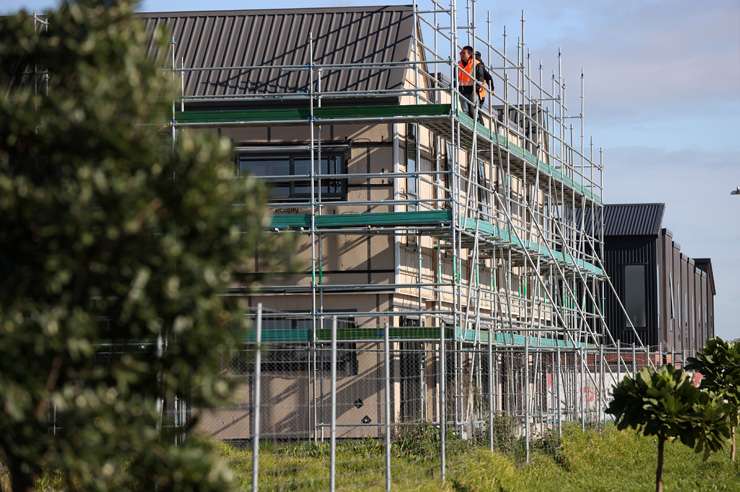Is 2023 a good time to buy an investment property? Some pundits will argue that any time is a good time to buy, regardless of the economic environment, but rising interest rates, tax and credit obligations and falling property prices, not to mention warnings of a recession from the Reserve Bank, are likely to give newbies pause for thought.
Loanmarket mortgage adviser Bruce Patten is still seeing a trickle of first time investors, despite the worsening the housing market climate. “The key thing is if you're buying for the long-term, there is no loss. Providing buyers have the ability to hang on to a property, then they will do well in the long term, even if the market drops a further 10% or 15%.”
Interest rates are higher than they were, but that’s not to say an investor can’t make it work, says Patten. Two-year fixed rate mortgages bottomed out at 2.53% in July 2021 but hit 6.35% at the beginning of December 2022, which, although not a record high, would still be a shock for would-be investors.
One big issue for many investors is the phased removal of interest deductibility for investment properties, which was first announced in March 2021. It means investors can’t claim all of the costs of running an investment property against their income.
Start your property search
Patten says new-builds are probably a better bet because mortgage interest can still be deducted as a cost. Even so, newbies need to ensure they can afford to pay the mortgages. “With higher interest rates resulting in much lower yields on investments, you have to consider whether it's the right time to purchase and whether you have the income to comfortably make up the shortfall,” Patten says.
“The reality is most people buying their first investment won't have the income to cover this, which is why investors aren't as active in the housing market at the moment. However, if house prices continue to drop, savvy investors will start buying up the cheaper houses on the basis that things will turn around in the future. For example if there is a change in government and the tax rules are changed again.”
The other big change in 2021, which has put some investors off buying houses, is the extension of the bright-line test from five years to 10 years. It means investors who sell within a 10-year period are charged tax on any profit they make from selling their investment property. For new homes the bright-line test is five years - another benefit of buying new.
You’re not going to get rich quick
One of the best bits of advice for new investors is they’re not going to get rich quick. Investment property requires work, and although it goes up in value, there are a lot of costs along the way. It’s a long game for most investors, who build up a number of properties over several decades.
Newbies often buy on the lure of capital gain only, especially if they’re working with a company that pushes property investment. “[To] anybody, including a young person, I would say they need to do their research, and they need to spend the time understanding what a property market cycle might look like,” says Patten.

New builds are exempt from some of the tax rule changes affecting property investors. Photo / Fiona Goodall
Beware of books and seminars that make property investment sound easy, he says. “Unfortunately, a lot of the literature is from people that have made lots and lots of money out of property. But they're not necessarily comparing apples with apples, because we've got different market conditions now from when [the books were written].”
Companies that sell investment properties as a package also make it sound simpler than it may be. These companies provide a financial plan, which recommends buying property, and take a cut from developers when the properties sell on.
“I've got no problems with using someone to find your property, but to have them approve your finance and give you financial advice, that's completely the wrong thing to do,” says Patten, who stresses the importance of research.
Investor associations are a great way to meet and learn from experienced investors, says Property finder Nick Gentle, of iFindProperty. “Knowledge is key. Don’t go out and find a guru with big seminars and the best sales pitch. Just go and find a quiet local achiever who’s done the sort of stuff you want to do and is willing to help you out. [Experienced] property investors may have done all this amazing stuff, but they don’t get up on the stage and jump up and down with bright lights.”
Gentle urges buyers to take the time to understand tax rules around property investing.
It’s not necessary to wait for the market to swing back in favour of investors. By then some of the best buying has passed. “I made 80% of my successes by doing it out of cycle,” says Gentle.
“If my brother came to me [now] and said, ‘what do I do’? If he was interested in new-builds, I would be suggesting to look for either [a property] near completion, and take all the risk out of the building cycle.”
Yield and capital gain
The point of buying a property investment is to make money. That can come about in two main ways. Yield and capital gain.
Yield is the ongoing return from the property from the rent. In theory the tenant pays rent, and after the mortgage, rates, insurance, maintenance and other costs are deducted, there is a profit left over, called the yield. Often there is nothing left over after the costs are deducted, but tax deductible items such as chattels depreciation can swing the balance giving a small yield on paper.

National leader Christopher Luxon. His party has promised to reverse some of the Government's tax changes. Photo / Mike Scott
The other return from property investment is capital gain. Even if there isn’t an ongoing return from the rent less expenses, there is still money to be made when the property is sold eventually because it has gone up in value.
But buying with an eye for capital gain can be problematic, especially if your investment property is running at loss. It becomes hard to buy more properties if the mortgages of one or more have to be topped up out of income from the owner’s day job.
Buying that first property
When it comes time to buy the first investment, a low maintenance property in an area with a thriving rental market is a good first step. Experienced investors often suggest going to 100 open homes, short-listing five or 10, then ‘doing the numbers’ to work out which will have the best financial return over time.
Investors typically search long and hard for higher yielding properties where the rent is high enough to cover more of the mortgage. They may be found, sometimes, in a geographical area, or be a type of property, such as apartments, or home and income. Those with DIY skills or the pockets for a renovation may look at options such as creating more rooms [legally], subdividing, or adding minor dwelling units to the property to create a second income stream.
A change in government?
Some investors may be hoping that a change in government at the next election could result in the bright-line test, and interest deductibility rules being rolled back. However, the bright-line tax was first introduced by a National government.
Owning rental property has also become more difficult under Labour thanks to the healthy homes requirements, and changes to the Residential Tenancies Act 1986, which removed the ability to evict tenants with 90-day notices.
















































































